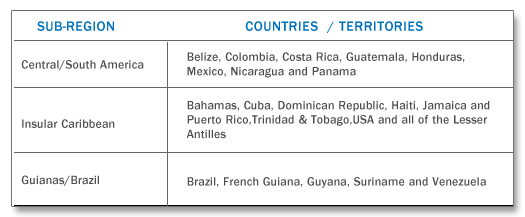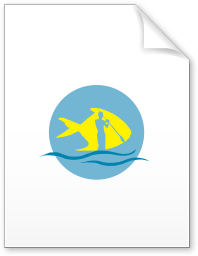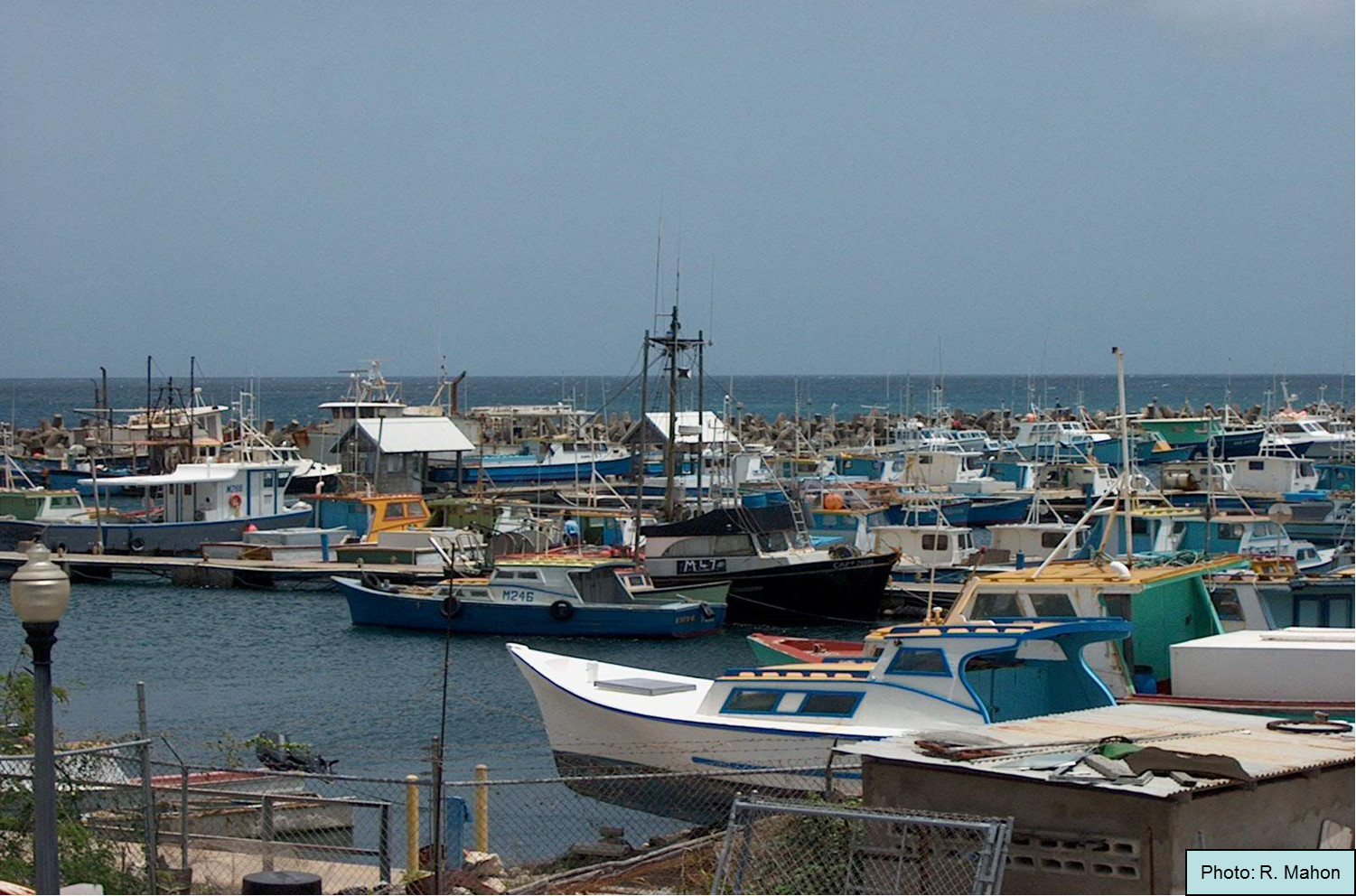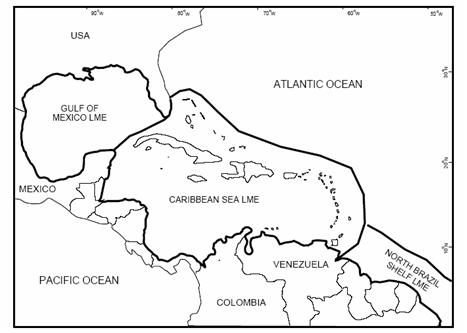- Brief Introduction
- Goals and Objectives
- Geographic Scope
- CLME People
The geographic scope of the full-sized GEF-funded CLME Project corresponds to 2 of the World's 64 Large Marine Ecosystems (LMEs):
The "Caribbean" LME -- The "North Brazil Shelf" LME
The participating countries in the CLME Project include the 23 GEF-eligible countries from the region (see the table and map below), together with the 2 "associated countries" Cuba* and Venezuela* (both of which are also GEF-eligible)
The project area also comprises of dependent territories from France, the Netherlands, the United Kingdom and the United States of America, which are not direct beneficiaries from the GEF-grant, but whose collaboration with the CLME Project is encouraged.
Antigua & Barbuda - Bahamas - Barbados - Belize - Brazil - Colombia - Costa Rica - Cuba* - Dominica - Dominican Republic - Grenada - Guatemala - Guyana - Haiti - Honduras - Jamaica - Mexico - Nicaragua - Panama - Saint Kitts & Nevis Saint Lucia - Saint Vicent & the Grenadines - Suriname - Trinidad & Tobago - Venezuela* - USA**
What came before: the PDF-B Phase of the CLME Project
Preliminary analyses of transboundary problems in the CLME were already conducted prior to the start of the GEF-funded "Full-Size" CLME Project (2009-2013), under the so-called GEF PDF Preparaty Block B Grant (2006-2008).
For this purpose the CLME Region was subdivided in 3 sub-regions, and for each one of these regions a preliminary Transboundary Diagnostic Analysis was completed. These 3 sub-regions were:
1. Insular Caribbean
2. Central & NW South America
3. Guianas/Brazil (NE South America)


Governance arrangements for marine
ecosystems of the Wider Caribbean Region

Regional Governance Framework Overview

Regional Governance Framework
CLME Governance Framework
Introduction
The CLME Transboundary Diagnostic Analyses TDAs identified weak governance as a root cause of the failure to sustain provision of goods and services from marine ecosystems in the Wider Caribbean. Thus this component of the project will explore approaches to enhancing regional ocean governance based on the conceptual LME Governance Framework. This framework, based on linked policy cycles at multiple levels, from local to international, was developed early in the PDF-B and is documented in CLME reports.
The need for the framework became clear when existing approaches capable of accommodating the diversity and complexity of the Caribbean could not be found.
RESEARCH METHODS
Document analysis
Survey questionnaires Personal interviews
Social network analysis Economic analysis
Caribbean Sea governance involves a diversity of networks of actors serving various purposes that seldom intersect effectively. Notably absent in most cases are interactions at the critical stage of communicating analysis and advice to shape coordinated decision-making. Thus the importance of having a framework that focuses on critical nodes for effective LME governance and on strengthening linkages across multiple levels has become increasingly evident. Most countries also lack capacity, and there is seldom a clear mandate by any national, sub-regional or regional level institution for management policies that address integration among sectors.
PARTICIPATION
Participatory methods will be used throughout to the extent feasible. In particular, the research team will interact with pilot projects and case studies.
Symposium vision for marine EBM in the Wider Caribbean
Healthy marine ecosystems in the Wider Caribbean that are fully valued and protected through strong institutions at local, national and regional levels providing effective governance that involves everyone, is fully understood and supported by the public, and enhances livelihoods and human well-being
Goals
The overall goal is to develop a framework for regional ocean governance in Wider Caribbean Region that accommodates the geopolitical realities of the region and to outline interventions for developing and enhancing the framework.
It is useful to reflect on the vision developed by the Symposium on Marine EBM in the Wider Caribbean as guidance for this framework.
Objective
The following key questions are to be answered in this Project component being implemented from January 2011 to October 2012 by the Centre for Resource Management and Environmental Studies (CERMES), University of the West Indies in collaboration with Dalhousie University.
What is involved in the development of a regional science-policy interface for ocean governance in the Wider Caribbean Region?

Depicting the ways in which key stakeholders can be networked in multi-level policy cycles to address marine resource issues facing the Caribbean Large Marine Ecosystem (CLME)
How can we assess ocean governance arrangements and their functionality for reef, pelagic and continental shelf fishery ecosystems?
What are the appropriate regional ocean governance framework options for input to the Strategic Action Programme (SAP)?
Information flyers outlining the work to be done in this component are available in English and Spanish
CLME GOVERNANCE
.Geographic Scope

The geographic scope is the entire CLME Project area comprising the Caribbean Sea and North Brazil Shelf LMEs.
Project Components
The detailed ToRs for this CLME Project component are as follows (see also) :
1. Pilot the development of regional science-policy interface for ocean governance by:
Developing linkages with selected major regional inter-governmental organizations (IGOs) to determine the most useful and desirable pilot inputs for ocean governance policy making with specific reference to the three fishery ecosystems;
Collaborating with relevant fishery bodies in developing these linkages;
Review the legal and institutional arrangements and international agreements currently in place in the CLME region (regional level) keeping focus on the three fishery ecosystems (continental shelf, pelagic and reef ecosystems);
Emphasizing valuation of ecosystem services as an input through a Wider Caribbean Region (WCR) overview via a desk study;
Developing selected identified pilot inputs (liaising with the monitoring and reporting component to develop inputs),
Liaising with the data and information component to inform an appropriate system for Delivering data and information to the regional IGOs, Obtaining feedback from them, and, Evaluating the pilot activity and providing recommendations for its further development
2. Assess ocean governance arrangements and functionality (e.g. complexity, diversity, dynamics). in the WCR with specific reference to the three fishery ecosystems by:
Assessing the relationships among the regional organizations that are engaged in Living Marine Resources (LMR) governance.
Evaluating the performance of the policy cycles associated with regional organizations with a mandate for ocean governance, with special emphasis on the major regional IGOs.
Collaborating with the pilot projects and case studies to support their governance assessment activities.
Incorporating the governance assessments from the pilot projects and case studies.
3. Propose appropriate regional ocean governance framework options for input to the SAP by:
Analyzing and incorporating the inputs on governance at local and national level provided by the pilot projects and case studies.
Taking into consideration, international and regional Multilateral Environmental Agreements (MEAs).
Reviewing existing institutional arrangements in the WCR.
Assessing the results of the CLME project activities (e.g. pilot projects, cases, TDA); Taking into consideration ocean governance principles.
Expected Outcomes
Governance and stakeholder analysis by fishery ecosystem.
Analyses of basic policy cycles.
Assessment of legal and institutional arrangements by fishery ecosystem.
Draft report on Regional Governance Framework highlighting strengths and weaknesses of current governance.
Draft regional governance framework options paper for the WCR region.





